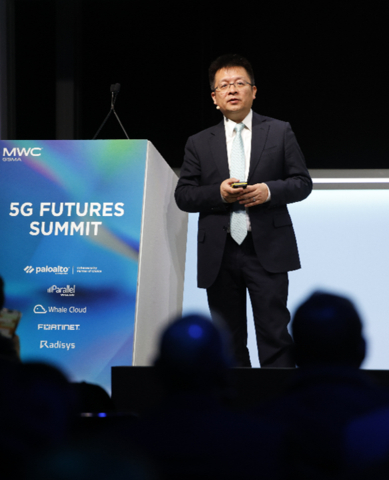BARCELONA, Spain--(BUSINESS WIRE)--At the Mobile World Congress (MWC) Barcelona 2023, GSMA hosted the "To Infinity and Beyond with 5G-Advanced" conference session as a part of the 5G Futures Summit. At the session, John Gao, President of Huawei 5.5G Domain, delivered a keynote speech titled "Bring 5.5G Into Reality, Build A Better Intelligent World". He discussed how the increasingly stronger network capabilities of 5.5G will protect operators' investments while creating business value. 10 Gbps downlink, 1 Gbps uplink, and deterministic experience will significantly improve user experience and network capabilities for use cases in the XR metaverse, FWA, and toB industry. Passive IoT and harmonized communication and sensing will also expand IoT and V2X market space to enable information-based services, facilitating operator success in toB and toV applications. As 5.5G gears up for commercial use, Huawei will continue conduct joint innovation with industry partners to promote the commercial use of 5.5G and build a better intelligent world.
5G is Booming, with New Services Demanding Stronger Network Capabilities
The maturing of 5G brings new changes to the communications industry.
Multi-dimensional and guaranteed user experiences are becoming increasingly important for consumers. There are three key trends in consumer services: cloudification, 3D, and AI. 3D cloud-based videos and games, naked-eye 3D calling, holographic meeting, and the XR metaverse bring users multi-sensory and realistic immersive experiences, which will require ubiquitous 10 Gbps and deterministic latency. In addition, AI significantly boosts efficiency in content production. As more content is generated by machines, network transmission requirements will become more demanding.
In the IoT field, all-scenario IoT is a basic demand. Diverse technical specifications in the fragmented IoT markets hinder the scaling up of IoT services. Industries such as warehousing, logistics, and electric power also have differentiated requirements on rates and costs. Therefore, scaling up markets and realizing business value are big challenges for the IoT industry.
5G has applied in some toB cases. In core production and automation processes, applications have higher requirements on rates, latency, reliability, and positioning precision, which calls for new technologies beyond 5G.
For V2X, as the mobile Internet continues to grow, most of the current vehicle-mounted systems can access the Internet to provide services such as system update, log upload, and in-car entertainment. Unmanned delivery vehicles have been rolled out in China. Besides, L2 and L3 autonomous vehicles need higher speeds to upload and download in-vehicle information. In addition, long-distance security awareness recognition outside vehicles and intelligent transportation management create higher sensing technology requirements.
Key 5.5G Technologies Have Been Verified to Have 10 Times Better Network Capabilities
New industry trends are powering upgrade of 5G. 5.5G has 10 times better network capabilities than 5G, with downlink rates improved from 1 Gbps to 10 Gbps and uplink rates improved from 100 Mbps to 1 Gbps. 5.5G delivers deterministic experiences and supports passive IoT and sensing on top of conventional communications capabilities.
A number of key 5.5G technologies have already been fully verified:
- Ultra-large-bandwidth spectrum such as mmWave and the upper 6 GHz (U6 GHz) has achieved 10 Gbps in the downlink and 1 Gbps in the uplink. ELAA-MM is used to solve limited coverage of high bands.
- Key spectrum decoupling technologies such as Multiple Band Serving Cell (MB-SC) and Flexible Spectrum Access (FSA) are used with intelligent slicing and layered QoS to flexibly configure resources and create deterministic user experiences.
- As a low-cost IoT technology, passive IoT allows 100 billion connections. Field tests have shown that it can reach a coverage distance of more than 200 m, which is more than 10 times longer than that of RFID. Passive IoT technology is expected to create more business opportunities in scenarios such as warehouse stock taking, logistics tracking, and environmental monitoring.
- In transportation, mmWave can sense vehicles within 1 km, with a precision of 0.5 m/s for speed, and meter-level or higher precision for distance. This technology significantly improves detection for road security and urban transportation management.
2023 will be a pivotal year for 5.5G. Progress has been faster than predicted in standards, spectrum, industry chain, ecosystem, and applications. 5.5G standards will be delivered in 3GPP Releases 18, 19, and 20. Release 18 will be frozen in H1 of 2024.
5.5G 10 Gbps is approaching, and development is accelerating for IoT with 100 billion connections. Harmonized communication and sensing has been put into trial operation.
As the saying goes, if you want to go fast, walk alone; and if you want to go far, walk together. John Gao concluded by stating that Huawei will continue to work with industry partners to conduct joint innovation and explore business scenarios, to fully prepare for the fast commercial rollout of 5.5G and build a better intelligent world.




